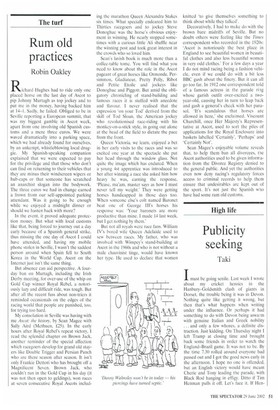Rum old practices
Robin Oakley
Richard Hughes had to ride only one placed horse on the last day of Ascot to pip Johnny Murtagh as top jockey and to put me in the money, having backed him at 14-1, Sadly, he failed. Obliged to be in Seville reporting a European summit, that was my biggest gamble in Ascot week, apart from one involving old Spanish customs and a mere three euros. We were waved dramatically into a parking space, which we had already found for ourselves, by an unkempt, whistleblowing local druggie. My Spanish-speaking companion explained that we were expected to pay for the privilege and that those who don't can find on returning to their vehicles that they are minus their windscreen wipers or hub-caps or that someone has scratched an anarchist slogan into the bodywork. The three curos we had in change earned a frown from our self-appointed parking attendant. Was it going to be enough while we enjoyed a midnight dinner or should we hasten back with more?
In the event, it proved adequate protection money. But what with local customs like that, being forced to journey out a day early because of a Spanish general strike, thus missing the one day of Ascot I could have attended, and having my mobile phone stolen in Seville, I wasn't the saddest person around when Spain fell to South Korea in the World Cup. Ascot on the Internet just isn't the same thing.
But absence can aid perspective. A fourday ban on Murtagh, including the Irish Derby meeting, for over-use of the whip on Gold Cup winner Royal Rebel, a notoriously lazy and difficult ride, was tough. But after all the recent fuss about non-triers it reminded occasionals on the edges of the racing world that people are punished, too, for trying too hard.
My consolation in Seville was having with me Ascot: the history, by Sean Magee with Sally Aird (Methuen, f25). In the early hours after Royal Rebel's repeat victory, I read the splendid chapter on Brown Jack, another reminder of the special affection which racegoers develop for grand old stayers like Double Trigger and Persian Punch who are there season after season. It isn't only Frankie Dettori who has brought off a Magnificent Seven. Brown Jack, who couldn't run in the Gold Cup in his day (it was not then open to geldings), won races at seven consecutive Royal Ascots includ
ing the marathon Queen Alexandra Stakes six times. What specially endeared him to Thirties racegoers and to jockey Steve Donoghue was the horse's obvious enjoyment in winning. He nearly stopped sometimes with a curious little Ali shuffle near the winning post and took great interest in the crowds who so loved him.
Sean's lavish book is much more than a coffee-table tome. You will find what you need to know about the role in the Ascot pageant of great horses like Ormonde, Persimmon, Gladiateur, Pretty Polly, Ribot and Petite Etoile and jockeys like Donoghue and Piggott. But amid the obligatory chronicling of stand-building and famous races it is stuffed with anecdote and flavour. I never realised that the expression 'on your Tod' derived from the skill of Tod Sloan, the American jockey who revolutionised race-riding with his monkey-on-a-stick style, in going out alone at the head of the field to dictate the pace from the front.
Queen Victoria, we learn, enjoyed a bet in her early visits to the races and was so excited one year at the spectacle she put her head through the window glass. Not quite the image which has endured. When a young 4st apprentice was introduced to her after winning a race she asked him how heavy he was, earning the response, 'Please, ma'am, master says as how I must never tell my weight.' They were getting horses handicapped in those days too. When someone else's colt named Baronet beat one of George III's horses his response was: Your baronets are more productive than mine. I made 14 last week, but I get nothing by them.'
But not all royals were race fans. William IV's bored wife Queen Adelaide used to sew between races. My father, who was involved with Wimpey's stand-building at Ascot in the 1960s and who is not without a male chauvinist tinge, would have known her type. He used to declare that women knitted 'to give themselves something to think about while they talked'.
Decoratively, I had to make do with the brown bare midriffs of Seville. But no doubt others were feeling like the Times correspondent who recorded in the 1920s: 'Ascot is notoriously the best place in England to see beautiful women in beautiful clothes and also less beautiful women in very odd clothes.' For a few days a year I do not mind racing being a fashion vehicle, even if we could do with a bit less BBC gush about the finery. But it can all go too far. In 1912 one correspondent told of a famous actress in the parade ring whose garish outfit over-excited a twoyear-old, causing her in turn to leap back and gash a general's cheek with her parasol. 'It's scandalous that horses are allowed in here,' she exclaimed. Viscount Churchill, once Her Majesty's Representative at Ascot, used to sort the piles of applications for the Royal Enclosure into baskets labelled 'Certainly', 'Perhaps' and 'Certainly Not'.
Sean Magee's enjoyable volume reveals that, to help them ban all divorcees, the Ascot authorities used to be given information from the Divorce Registry denied to the general public. And yet the authorities even now deny racing's regulatory forces access to criminal records to help them ensure that undesirables are kept out of the sport. It's not just the Spanish who have had some rum old customs.


































































 Previous page
Previous page